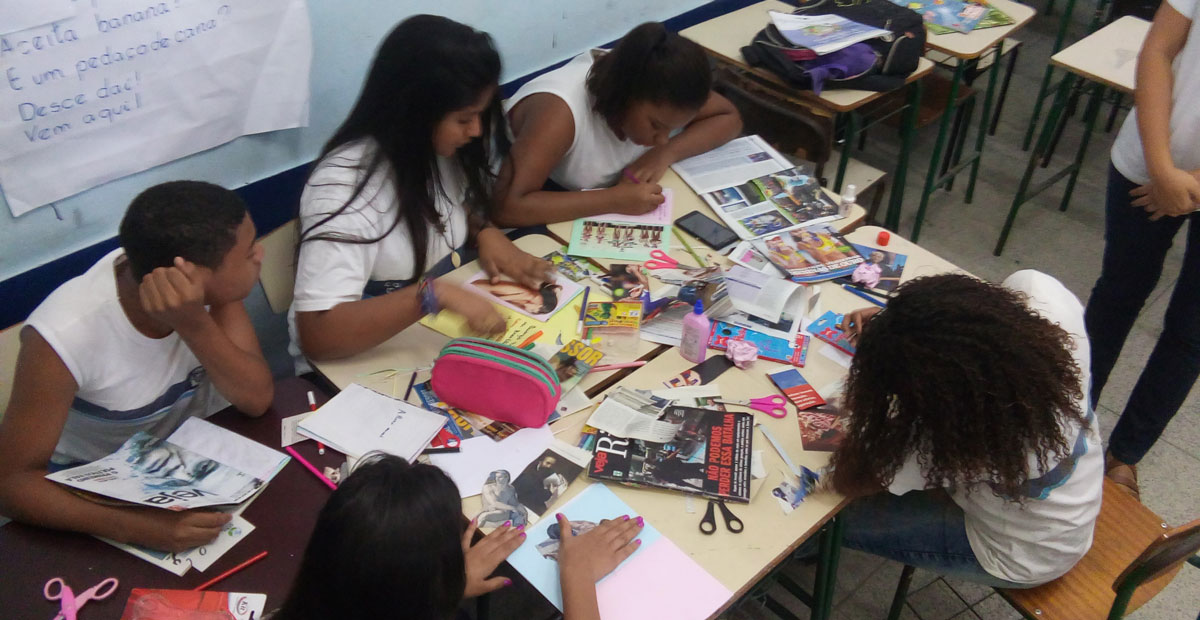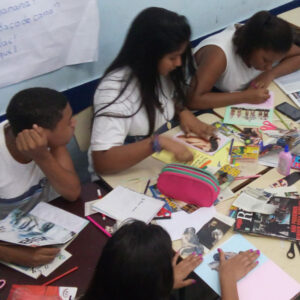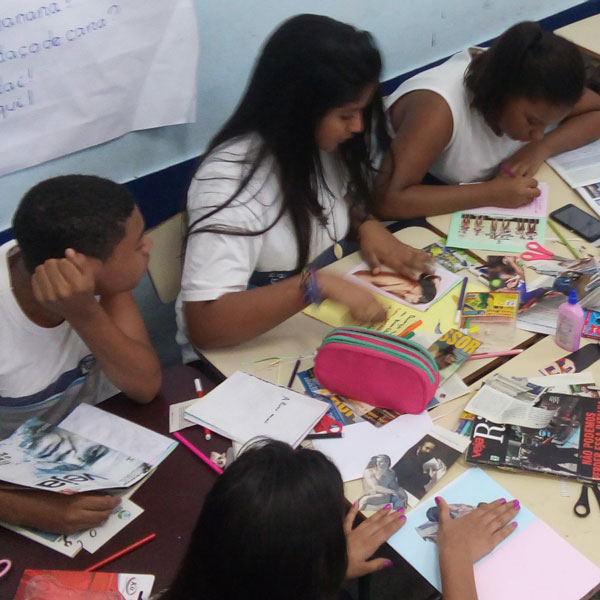
By Alexa Hassink, Senior Communications & Advocacy Officer at Equimundo and Kristina Vlahovicova, Research Officer at Equimundo
“I have confidence in myself now,” shares a female participant in the Youth Living Peace program in Democratic Republic of the Congo; “I have seen that girls can do a lot of things. Having the facilitators and talking with others girls helped me to choose my goals, to choose my friends better- those who will be good influence for me and my future.”
This participant is one of over 1,150 adolescent girls and boys who received group education and/or counselling referrals as part of Youth Living Peace, a program focused on preventing and responding to sexual and gender-based violence against adolescent girls (aged 13-19) in post-conflict and high urban violence settings.
Experiences and witnessing of violence in childhood can have long-term physical and psychological impacts, including around men’s use of violence against future intimate partners, and women’s experiences of it. Youth Living Peace was designed as a multi-level psychosocial support approach to identify, challenge and shift attitudes and behaviors around gender equality, use of violence, and self-efficacy in relationships.
The intervention was coordinated by Equimundo and implemented between 2015 and 2017 in Brazil by Instituto Equimundo and in Democratic Republic of the Congo (DRC) by HEAL Africa. With support from the United Nations Trust Fund to End Violence against Women, the program reached nearly 9,000 community members, in addition to 125 education professionals, and 87 government representatives.
The program aimed to help adolescents to heal from trauma and deconstruct harmful gender norms in hopes to break intergenerational cycles of violence. One male participant who seems to have internalized the programs messages comments, “Before I didn’t respect women and girls, I was considering them as things, that have little value that should serve us men: at home doing the work and as sexual partners. Now I have seen that they are people just like men and boys and that they can achieve things in their lives.”
Youth Living Peace was implemented with the intention to scale and institutionalize this individual level work through school-wide campaigns and advocacy with key stakeholders in schools, government, and civil society organizations on policies and programming to prevent and respond to violence against adolescent girls and boys.
After three years of implementation, an external evaluation led by inFocus Enterprises Ltd. looked into the efficiency, relevance, effectiveness, impact, and sustainability of the project, finding the approach to be effective and appropriate for addressing experiences, knowledge, attitudes, behaviors and responses related to violence against women and girls for participants as well as positively impacting a broader group of stakeholders, including teachers and education professionals.
“The students who participate in the project are of a very different mind,” says one teacher from Brazil where the program was implemented, “it’s startling in the classroom when you bring up one of these issues, the way they conceptualize it, they have a certain ease in stating their case, in defending the issue. It’s impressive.”
While there were certain limitations, evaluation findings provided a case for sustained implementation, due to Youth Living Peace’s value and impact across intervention levels, and a case for scale up, as it provides new insights into challenges, opportunities and a road map for future implementation. Selected key findings from the external evaluation are as follows:
Findings from the impact evaluation in Brazil revealed:
- Increased knowledge and ability to navigate issues related to gender; increased empathy and non-violent communication; deconstruction of harmful masculine norms; improved attitudes on sex and consent; and acceptance around homosexuality among program participants.
- A 28% decrease in female participants who reported having been insulted or humiliated in the last three months, and a 37% decrease in experiences of verbal and psychological violence amongst male participants.
- An increase from 88% to 100% of teachers who would report a case of abuse to the appropriate external bodies (child protection unit/social services).
- Improvement in understanding of gender norms reported by educational staff and partners from local government (NIAP – Interdisciplinary Centre for the Support for Schools).
In DRC, the following impacts were observed:
- Participating adolescents reported greater ability to gain control over and improve their lives, denounce acts of violence and take action, and reported an increase social support through solidarity.
- Girls experienced more self-confidence and had more opportunities to play active roles at school after participating in the intervention.
- About 60% of participants at baseline reported tense relationships with their parents; while in post-test, 100% reported beginning to ask them about sexuality, relationships, and family plans.
- Communities supported the efficacy and expansion of the program.
- The project supplied the Ministry of Education with never-before seen data that helped to operationalize Youth Living Peace within the Division of Primary, Secondary and Vocational Education Plans (EPSP) to address gender issues, reproductive health, sexuality, and relationships.
The program, implemented in Brazil and Democratic Republic of the Congo, incorporates ideas from 1) Equimundo’s Program H– adapted in 34 settings – designed for young men to encourage critical reflection about rigid norms related to manhood and encourages transformation of stereotypical roles associated with gender; 2) Living Peace, which provides psychosocial support and group education to men and their partners in post-conflict settings to address the effects of trauma and develop positive, nonviolent coping strategies; as well as 3) a U.S.-based intervention, Expect Respect, which has been found to reduce boys’ self-reported psychological and sexual teen dating violence perpetration and aggression and to improve healthy conflict resolution behaviors.
In considering future implementation efforts of Youth Living Peace, and related approaches, recommendations include:
- Continue to build evidence base around what works in psychosocial programming efforts more broadly and across the lifecycle.
- Incorporate intersectional focuses, into the curriculum, in particular highlighting intersections of race and gender, to reflect the multiple identities of young people and their lived realities.
- Create a multi-stakeholder approach and a wider ‘ecosystem’ to ensure that this work is being implemented across sectors to influence both private and public attitudes and behaviors around gender equality and violence.
- Contextually adapt the approach to each school or community setting through a participatory process, and consider how this could be used as a mechanism to train teachers in similar contexts.
- Create and maintain effective referral systems, confidential reporting mechanisms, clinical supervision to ensure that all children receive the help they need in a timely manner, and that facilitators and institutions are creating a safe and supportive environment for young people;
- Focus on the long-term integration of the project materials into the curriculum and response policies into institutions for sustainability of these efforts.
Learn more about Youth Living Peace here.
The United Nations Girls’ Education Initiative (UNGEI) highlights Youth Living Peace in their blog as a school-based program working to shift the norms that maintain gender inequality, and as a case study, adapted from this content.

